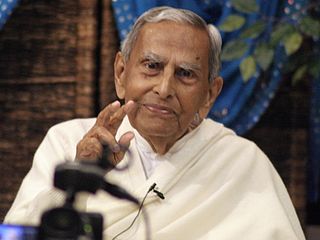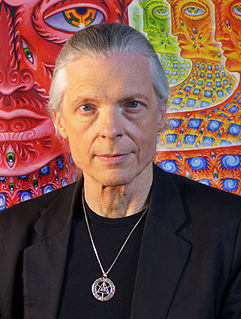A Quote by Frederick Lenz
The role of the Buddhist teacher is to explain your options and to show you what creates karma. All our discussions are basically karmic until you're fully engaged in samadhi.
Related Quotes
God does not deal our karma to us as a punishment. Karma is a manifestation of an impersonal law as well as a personal one. The purpose of our bearing our karma is that karma is our teacher. We must learn the lessons of how and why we misused the energy of life. Until that day comes when we recognize the Law of God as a Law of Love, we will probably encounter difficulties. But if we will only hasten that day's coming into our own life, we will recognize that karma is actually grace and beauty and joy. [and love and awareness and hope! -EM]
What brings the karmic result from the patterns of our actions is not our action alone. As we intend and then act, we create [our] karma: so another key to understanding the creation of karma is becoming aware of intention. The heart is our garden, and along with each action there is an intention that is planted like a seed. The result of the patterns of our karma is the fruit of these seeds.
When we cross the gates of death, our karma is all we take with us. Everything else that we enjoyed in this life we leave behind... Our karma is the only thing that will count in determining our rebirth, for our next life is nothing but the effects of our karmic tendencies that materialize in our perception.
Karma is experience, and experience creates memory, and memory creates imagination and desire, and desire creates karma again. If I buy a cup of coffee, that's karma. I now have that memory that might give me the potential desire for having cappuccino, and I walk into Starbucks, and there's karma all over again.
From a Buddhist point of view, the actual experience of death is very important. Although how or where we will be reborn is generally dependent on karmic forces, our state of mind at the time of death can influence the quality of our next rebirth. So at the moment of death, in spite of the great variety of karmas we have accumulated, if we make a special effort to generate a virtuous state of mind, we may strengthen and activate a virtuous karma, and so bring about a happy rebirth.
This Law -- whether Conscious or Unconscious --predestines nothing and no one. It exists from and in Eternity, truly, for it is ETERNITY itself; and as such, since no act can be co-equal with eternity, it cannot be said to act, for it is ACTION itself...Karma creates nothing, nor does it design. It is man who plans and creates causes, and Karmic law adjusts the effects; which adjustment is not an act, but universal harmony, tending ever to resume its original position.
The law of karma is neither fatalistic nor punitive; nor is man a hapless, helpless victim in its bonds. God has blessed each one of us with reason, intellect and discrimination, as well as the sovereign free will. Even when our past karma inclines us toward evil, we can consciously tune our inclination towards detachment and ego-free action, thus lightening the karmic load.
Knowledge passes from dance teacher into the student through the process of mane, which is often translated as imitation, but learning to dance is more a process of total identification than of simple copying. We repeat the movements of our teachers until we can duplicate them exactly, until, in a sense, we have absorbed the teacher's mastery into ourselves. Artistic technique must be fully integrated into the cells of our bodies if we are to use it to express what is in our hearts, and this takes many years of practice.





























